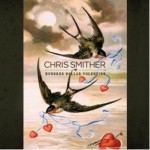 By Terry Roland
By Terry Roland
— At the end of Chris Smither’s latest album Hundred Dollar Valentine, there is a hidden track, “Rosalee,” a rough demo-like recording. According to the comments at the end of the session he wrote it 35 years ago and it has rarely been performed. If Smither’s career still holds such hidden treasures, this is reason enough to interest any roots enthusiast. I
t sums up much of what his career has been: contemplative and reflective while remaining slightly philosophical and lighthearted, all buoyed by the simple beat of Piedmont blues intricately delivered with the best finger picking this side of Walden’s Pond.
This hidden gem is not the only reason to give some attention to Smither’s new album. At times, his past releases have had a tendency to meander and wander into familiar melodies and lyrical themes. He’s also made a point of rounding out his albums with reinventions of classic songs by singer-songwriters like Danny O’Keefe, Tim Hardin, Bob Dylan and Randy Newman.
This time out, though, Smither has turned in 11 original songs which vary in approach from his usual philosophical, mystical musings and a bouncy, funky jug band-leaning series of songs. The title track says it all with bluesy longing-for-love lyrics bouncing off the feel of a happy washtub rhythm.
“What’d I Say,” is a succinct commentary on today’s information, sound-byte loving culture which he say provides, ‘fast for the brain but not too filling.’ Its wisdom is delivered with a biting back-beat.
The acoustic band on this album is allowed to work with minimal overdubs, producing a live sound. Included are Bill Conway on percussion, Kris Delmorst on cello, Jimmy Fitting on harmonica, David Goodrich on slide guitar and Ian Kennedy on violin.
These are not your typical jug band instrumentalists, but it’s to the musicians’credit that they make this work in a very tight, lean and clean way.
Anita Suhanin and Robin Smither also provide a sweet vocal contrast to Smither’s rough singing style. All of this is just the right mix for what Smither is shooting for here, which is a rough, swampy, dirty sound with all of the rough edges intact.
Indeed, this is one of the dynamics which makes this record so appealing and sets it apart from previous releases. While his lyrics have flowed well over the years, at times, it’s been hard to find the music to match. As a result, familiar song patterns and formulas have emerged, aliability. But with this fresh production of original songs and a band of musicians who understand the New England blues-barb for who he is, all liabilities are gone and Smither breaks through, delivering an engaging and entertaining album and his best in years.
